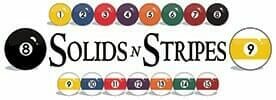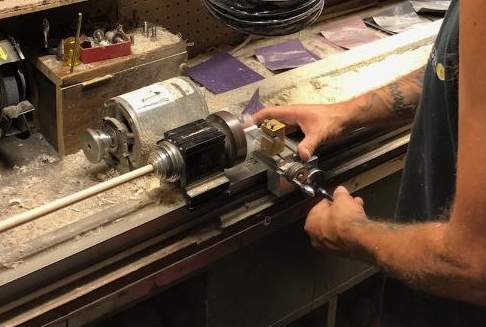
The optimum cue shaft diameter and taper style for any individual player is mostly determined by what size feels and works best for them. Some of the things that might influence a pool players choice of shaft size are what type of bridge they use, how large or small their hands are, how long or short and how skinny or fat their fingers are, their eye sight qualities, and sometimes what game of billiards or snooker they are playing. Thinner shafts are more flexible and thicker shafts are stiffer. The taper style of the shaft makes a huge difference in how it play as well no matter what diameter the shaft is. There are also all kinds of high tech shafts out there these days which further complicate these matters but the actual diameter preferred by any individual player is pretty much a personal preference. Any wooden shaft can be made smaller by turning it down in a lathe or by sanding them down. We prefer the sanding method for the wooden portion but we do turn down the ferrules.
We felt that sanding away the wood doesn’t raise the grain as much which can allow excess moisture to be absorbed which can also lead to warping. We prefer to not remove more than 1/2mm of material per day in order to further minimize the possibility of warping while we are working on them. This also allows for very small warps experienced overnight to be removed the following day on the next 1/2 or 1/4mm turned off. We store the shafts in an airtight cabinet in between turns to help prevent any moisture absorption. If your shaft does already have a very slight warp then those do sometimes go away or at least get a little better after being turned but there is no guarantee this may happen. It is possible that your shaft may warp while we are working on it but I cannot remember one single time that has happened in thousands of turn downs we have preformed over the last 21 years that we have offered this service.
You must keep in mind that it’s a very well known fact that skinnier shafts do warp much more easily than thicker ones do. This is exactly why all cue makers that do offer warpage guarantees cut those guarantees off at a certain diameter. Different cue manufactures have different parameters for this cut off point. Many cut off their warpage guarantees at 11.75mm but some will allow for only 1/2 mm to be removed period no matter what size the shaft was originally. When we do a turndown unless someone prefers it done differently we will actually sand the wood away and we will put a taper on your shaft that we call a no taper pro taper. This style of taper allows for more flexibility which we feel lowers cue ball deflection and it also means that your shaft will not be changing size as it slides through your bridge hand.
All cue manufactures produce their version of a pro taper but many of these actually have a very slight taper to them so we refer to these kinds of pro tapers as a slow taper pro taper just to be a little more specific. The slow taper pro tapers usually increase in size by about .010″ by the time it’s measured about 10″ below the tip. There is also a much more aggressive type of taper which is known by many as a conical taper. This type of taper is much stiffer but it is also preferred by some players. We have at our shop several shaft diameter sample sizes you can see and feel and you are also more than welcome to hit some balls around with whatever different sizes of shafts we might have available on our cue display racks in order to help you make a decision on what size you want. Be fully aware that once it’s turned down then there is no turning back without replacing the shaft all together so sometimes it’s best to take it down a little at a time if your not for sure what you want. Most players fell that they are able to aim much better when sighting down a smaller diameter shaft.Some take this to the extreme and turn their shafts down to 10mm or even below. We have taken a few down to as little as 9mm. I’ve seen even smaller than that when folks bring super skinny ones in to have their tips replaced. Anyway






